Books of the month: From Jonathan Coe’s Mr Wilder and Me to Thomas McMullan’s The Last Good Man
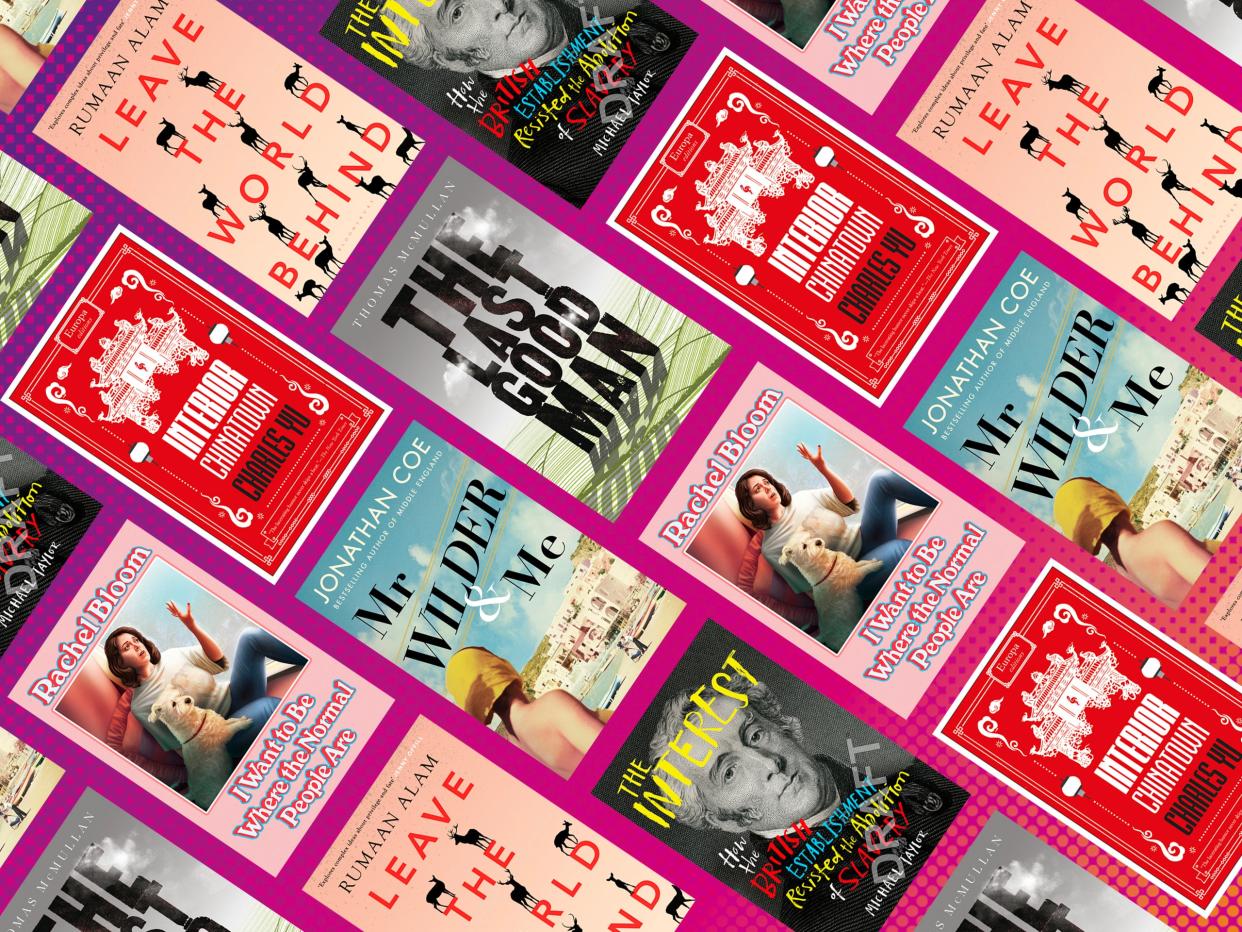
This month’s books
(iStock/The Independent)- Oops!Something went wrong.Please try again later.
- Oops!Something went wrong.Please try again later.
Joseph Stalin was subjected to “merciless abuse” as a child, the beatings from his father just one of the many factors behind why an idealistic youth – who wrote romantic poetry – metamorphosed into a brutal dictator. Ronald Grigor Suny’s monumental 857-page study Stalin: Passage to Revolution (Princeton University Press) draws on a wealth of new archival evidence from Stalin’s early years in the Caucasus to chart his rise to power.
Matthew Parris explores the theme of successful people who overcame intense suffering in their childhoods in his book Fracture: Stories of How Great Lives Take Root in Trauma (Profile Books). Parris puts an eclectic group, including Napoleon, John Lennon and Freddie Mercury, under the psychological microscope. We will learn more about Barack Obama’s odyssey in volume one of his memoirs, A Promised Land (Viking), which is certain to be the publishing event of the month.
There is a sweet photograph of the poet and director Caleb Femi as a child (posing with a Manchester United birthday cake) in his debut collection Poor (Penguin), a blend of essays, photography and evocative poems (like the short, haunting The Story of Ruthless). The striking images capture the differing emotions of life on London’s North Peckham estate. One particularly powerful moment is Femi’s journal entry about the Grenfell tragedy. Femi eloquently bemoans government indifference and the complicity of a media “sipping on the ripe mourning of the poor”.
As well as a powerful new study of Britain and slavery by Michael Taylor (reviewed in full below), there is The Shortest History of England by James Hawes (Old Street), which is an engaging, informative sprint through the story of our little island, from Caesar’s failed landing at Ebbsfleet to a concluding discussion of why “the ordinary English fell for Boris”. In The Glamour Boys (Bloomsbury) MP Chris Bryant tells the story of the vilified gay British politicians who spoke out against Hitler in the 1940s.
For fiction fans, I’d recommend Alison Irvine’s Cat Step (Dead Ink), a dark, thoughtful meditation on motherhood, and Sally Gardner’s gorgeous love story The Snow Song (HQ), which has more than a touch of magic realism. There is plenty of bleak realism in Decameron Project: 29 New Stories from the Pandemic (Simon and Schuster), which includes specially commissioned tales from Margaret Atwood and Andrew O’Hagan. Atwood also contributes poems to Cutting Edge: Noir Stories by Women (Pushkin Vertigo), which is edited by Joyce Carol Oates. There is also an excellent short story collection from Nicole Krauss called To Be a Man (Bloomsbury), my favourite tale of which was the superb opener Switzerland.
The best new thrillers include Luca Veste’s The Game (Simon and Schuster), Sebastian Fitzek’s The Package (Head of Zeus), Ivy Pochoda’s These Women (Faber), Simon Kernick’s Kill a Stranger (Headline) and Michael Connelly’s The Law of Innocence (Orion). A special mention for James Wilson’s Coyote Fork: A Thriller (Slant Books), a disturbing chiller about a social media giant called Global Village and its creepy, predatory founder Evan Bone. The novel is an insightful take on modern life, including the viral nature of online hatred.
Finally, there is the UK publication of a must-read book for jazz fans. Ricky Riccardi’s biography Heart Full of Rhythm: The Big Band Years of Louis Armstrong (Oxford University Press) is a brilliantly researched, vivid portrait of the great trumpeter, which covers a golden era from 1929 to 1947.
Novels by Jonathan Coe, Charles Yu, Rumaan Alam and Thomas McMullan, as well as Rachel Bloom’s memoir, are reviewed in full below.

Mr Wilder & Me by Jonathan Coe ★★★★★
The "Me" in the title of Jonathan Coe’s 14th novel is Calista Frangopoulou, whom we meet first in London in 2013, when she is 57 and her life is in flux. One of her twin daughters is about to leave for Australia, the other is deciding whether to terminate an unplanned pregnancy. As Calista ruminates on her family problems, she begins to look back on her most exciting adventure as a youngster: the time in 1977 when she left Athens to join the film set of Fedora to act as interpreter for legendary Hollywood director Billy Wilder.
As the memories start to flow, Calista realises that Wilder, who was making his 24th and penultimate film, was at the time in the throes of a similar crisis: like Calista, he had come to the realisation that “what he had to give, nobody really wanted any more”.
As well as being an absolute treat for fans of cinema, Mr Wilder & Me is a beautiful coming-of-age tale and a moving meditation on success, failure and the way the past haunts all of us. Coe deftly blends fact and fiction – the acknowledgements cite specific incidents and quotations from Wilder – and is full of memorable scenes (including a painfully acute depiction of a woebegone scriptwriter trying to hawk a dreary film about Kingsley Amis) and witty cameos (including a hamburger-obsessed Al Pacino).
At the heart of the book’s success is how Coe brings Wilder gloriously to life, capturing both his lingering, implacable melancholy and his caustic wit and charm. Of course, the man who made The Seven Year Itch was often extremely funny, something we see in a laugh-out-loud anecdote about a proposed film based on ballet star Nijinsky.
Coe shows Wilder long after the Oscar wins, when the acclaim for masterpieces such as The Lost Weekend, The Apartment and Some Like it Hot is a distant memory. The Wilder here is in decline, bemused and infuriated by becoming a Hollywood footnote. Yet he is still generous and warm-hearted towards the young Calista.
One of the best characters in the novel is Wilder’s friend and long-term writing partner I. A. L. Diamond, and through him we gain a deeper understanding of the complex, troubled director. We also see the dark humour that attracted Wilder to working with Diamond for decades. One of Wilder’s greatest films was 1951’s Ace in the Hole, a bitter commentary on tabloid journalism and the imbecility of the public. When Diamond explains to Calista that this was Wilder’s first commercial failure, he (or Coe?) adds laconically that, “people do not like paying money to go to the cinema to have their ugliness reflected back at them”.
The backdrop to Wilder’s story is tragedy. In 1945, Wilder made a film called Death Mills about the Holocaust, a documentary that in itself is beyond haunting. The most daring and moving passage in the book is Wilder’s account, told in a Munich restaurant and presented in the form of a screenplay, of his life as a young man in the Second World War, a period in which the Nazis murdered the filmmaker’s mother and grandmother in concentration camps.
The novel, like Wilder’s films, is bittersweet – and Coe finds a satisfying way to end this masterful tale. And even if you know little about Wilder, this thought-provoking book will hopefully prompt you seek out Wilder’s sensational catalogue of movie work.
Mr Wilder & Me by Jonathan Coe is published by Viking on 5 November, £16.99
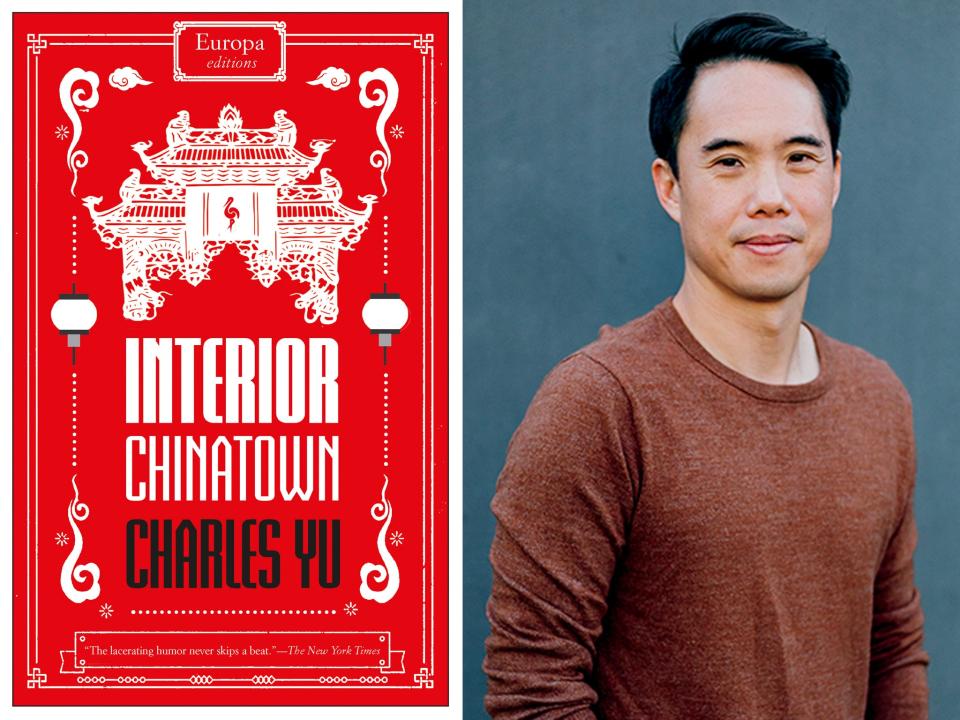
Interior Chinatown by Charles Yu ★★★★☆
“It sucks being Generic Asian Man,” says Willis Wu, the protagonist of Charles Yu’s dazzlingly inventive novel Interior Chinatown, which was shortlisted for the 2020 National Book Awards.
Yu, a Los Angeles native born to Taiwanese parents, has written for the television show Westworld – and the brilliantly offbeat Lodge 49 – and he uses the landscape of Hollywood tropes to create a witty, existential portrait of Asian American identity.
The novel opens with bit-part actor Wu’s resumé, which boasts that he is “able to do Face of Great Shame on command”, in a repertoire that includes “Disgraced Son, Delivery Guy, Silent Henchman and Guy Who Runs in and Gets Kicked in the Face”. What Wu really wants is to land the dream role of Kung Fu Guy, or simply an Asian man “who gets to talk”. Wu’s narrative also highlights the economics of racism. It doesn’t pay well to play “Wizened Chinaman”. “Why do you think he fishes bottles and cans out of the trash?” he remarks.
This experimental novel, narrated in the second person and written in the form of a screenplay, captures the weirdness of existence. What are the rules of reality where everyone is an actor and the world itself is like an insidious television production studio? As well as providing a device to satirise lame television procedurals – Wu appears in a clichéd “black and white buddy cop” show, an educational kids show and a courtroom drama – the screenplay device sums up Wu’s lack of control over a life in which Asian Americans actors are little more than human props.
Interior Chinatown is a funny, biting take down of the racism in the entertainment industry. “You talk in Fake Chinese to Fatty Choy, and he pretends to answer in some gibberish he’s making up as he goes along,” Wu says. But there is a more serious backdrop. There is a chilling section in which Wu’s young housemates compare the racist names they have been called. In one case, a student friend recounts the terrible consequences of a violent hate crime.
Asian American women are exploited too, and not just the ones picked for their looks to play “Girl with the Almond Eyes” – real-life indignities and unwanted sexual attention are a routine of life for a “Pretty Asian hostess” engaged in restaurant work.
Yu’s depiction of the day-to-day misery of living in crowded run-down Chinatown apartments is both humorous and heartrending: it’s hard to read the account of Old Fong and the cracked shower basin without laughing and weeping. Within a comedy about the dislocation felt by many Asian Americans, there is also a nuanced portrait of family love and respect for the elderly. Interior Chinatown certainly helps you appreciate why old dudes from rural Taiwan can perfectly nail a John Denver song about wanting to go home as they sing karaoke late at night.
Interior Chinatown by Charles Yu is published by Europa Editions on 5 November £12.99

The Interest: How the British Establishment Resisted the Abolition of Slavery by Michael Taylor ★★★★☆
Michael Taylor says that he is keen to “interrogate the myths of British history” in his powerful analysis of how Britain’s rulers were violently supportive of colonial slavery. Although King William IV declared that slaves “were the happiest people in the world”, the reality was intensely grim. Taylor details the life of these poor souls, many broken and sick as they toiled for up to 19 hours a day in the fields. Slavery allowed aristocrats such as Thomas Thistlewood the freedom to behave like psychopaths. As well as inventing hideous torture methods, the plantation tycoon was also a serial rapist of slave women and children. Taylor states that Thistlewood “committed 3,852 sexual assaults”.
Although trading in humans was prohibited in 1807, even the bill’s main exponent William Wilberforce refused to accept for over a decade afterwards that the existing enslaved should be freed (he called the idea “madness”). It took another 26 years for slavery to be abolished in British colonies. Taylor says this long delay was down to those he calls “The West India Interest”, an elite involving wealthy planters, hundreds of MPs, civil servants, financiers, landowners, clergymen, judges and military chiefs. The pro-slavery voices included publisher John Murray, The Spectator magazine, William Gladstone and George Canning.
Taylor says that the private papers of The Duke of Wellington “reveal that he was working doggedly to frustrate the abolitionists”. Pro-slavery factions used “serious voter intimidation” to prevent the election of abolitionist supporters. The Interest also hired gangs of thugs to break up anti-slavery meetings. The historian cites contemporary sources recounting instances where “many broken heads occurred”.
Slavery brought untold riches in a trade that was always a matter of economics, driven by the need to send the cheapest possible labour to work in the colonies. Taylor explains that racism went hand-in-hand with the business, because people needed a way to rationalise slavery to themselves (they were helped by a clergy, who associated white and lighter skins with Christian concepts of “goodness” and purity and black skin with darkness and evil).
The Slavery Abolition Bill finally passed in August 1833. The breakthrough had numerous causes, including a set of determined anti-slavery politicians such as George Stephen, and it came after the political collapse of the Tories. Public opinion had shifted, too, a result in part of slave revolts in the Caribbean.
The book includes a fascinating map showing the largest slaveholding centres in the United Kingdom, which included Inverness and Norwich along with London, Bristol and Glasgow. Another engrossing part of the book is the insight into how plantation owners were paid off. “This cost the British government £20m. In 1833, that was 40 per cent of the government’s annual expenditure, and until the banking rescue package of 2008 remained the largest specific pay-out in British history,” he says. It’s stunning to think that these slave owners were paid £340bn in today’s money. Numerous universities and institutions benefitted from this blood money, including the Rothschild, Montefiore and Deloitte dynasties (and George Orwell’s ancestors, for what that’s worth).
One reason that historians believe that Britain’s involvement in slavery is marginalised is that, unlike America, “the enslavement of Africans was quarantined at a distance of several thousand miles”. In consequence, argues Taylor, the British “remember” that Parliament abolished slavery but not that Parliament had spent two hundred years encouraging and protecting this evil trade. In an era when black history is at last being given its rightful due, Taylor’s potent book shows why slavery took root as an essential part of British national life and why to remember it otherwise is “misleading and self-serving”.
The Interest: How the British Establishment Resisted the Abolition of Slavery by Michael Taylor is published by The Bodley Head on 5 November, £20
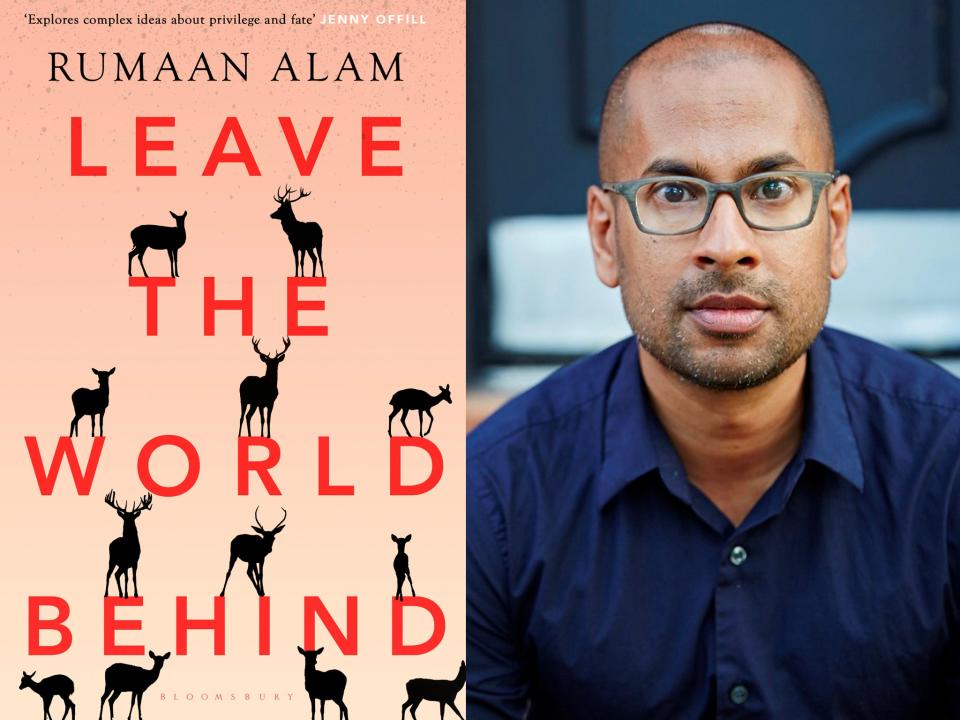
Leave the World Behind by Rumaan Alam ★★★★☆
When Amanda, an account director in advertising, finds the perfect-sounding Airbnb holiday retreat – an advert entices guests to “step into our beautiful house and leave the world behind” – she and husband Clay, a college professor, and their children Archie, 15, and Rose, 13, head off to the remote Long Island retreat.
This idyllic holiday home in Rumaan Alam’s Leave the World Behind has a swimming pool, a hot tub and a kitchen full of expensive marble. It is hired by a consumerist family, used to being pampered. We are deliberately shown the detail of Amanda’s shopping trip, as she stocks up on all kinds of bourgeoisie treats: from avocados and limes to fancy crackers and extra-garlicky hummus.
Their sweet peace is suddenly shattered when the owners – a rich, older black couple called George Washington (known as G.H.) and his wife, Ruth – turn up seeking refuge, saying that New York has been plunged into darkness and that nothing is safe. It gradually becomes apparent that the power cut which hit the whole eastern seaboard is linked to something worse. Has there been a war, a nuclear or climate catastrophe? With no internet, no television and no phone signal, it is impossible for these stranded strangers to know what is really going on. Alam, another National Book Awards finalist, raises some interesting questions: do we really only believe something is happening to us when we see it on our mobile phones?
Alam shrewdly allows the reader to know more than the people trapped in their isolated paradise (we know that panic has “metastasized” in New York, in Alam’s memorably chilling phrase) because for Amanda, Clay, George and Ruth, there are no explanations. “You demanded answers, but the universe refused. Comfort and safety were just an illusion,” one says. Incidentally, the novel nails the paranoia and “infinite worry” of being a parent: is there any hell worse than being unable to protect your loved ones?
More and more weirdness seems to occur around the house, including terrifying sonic boom noises and the sight of mass herds of migrating deer, or a flock of bright-pink flamingos drinking the water of the swimming pool. Alam does not linger on the specific horrors of the apocalypse; he instead looks at the human dilemmas of being in terror at the unstoppable forces of nature. In one speech, G.H. makes clear that the ominous signs were there for all to see, from ecological disasters and rampant political hatred to capsizing vessels crowded with Africans. “No one could plead ignorance that was not wilful,” he says.
When the absolute worst happens, who can you trust, who can you rely on? This most human of dilemmas is brought painfully home in a devastating encounter in which G.H. drives to his local handyman for help. Alam shows us that this intelligent, successful businessman has completely mistaken a boss-worker relationship for real friendship.
The pacing of the second half of Leave the World Behind is sharp: it is gripping to witness the rising panic of the characters as they face up to their worst fears (and you will certainly wince at what happens to Archie). Alam has written a genuine literary thriller, one that is also a disturbing window into our precarious age. It’s no surprise that the novel has already been snapped up by Netflix for a film to star Julia Roberts and Denzel Washington.
Leave the World Behind by Rumaan Alam is published by Bloomsbury on 12 November, £14.99
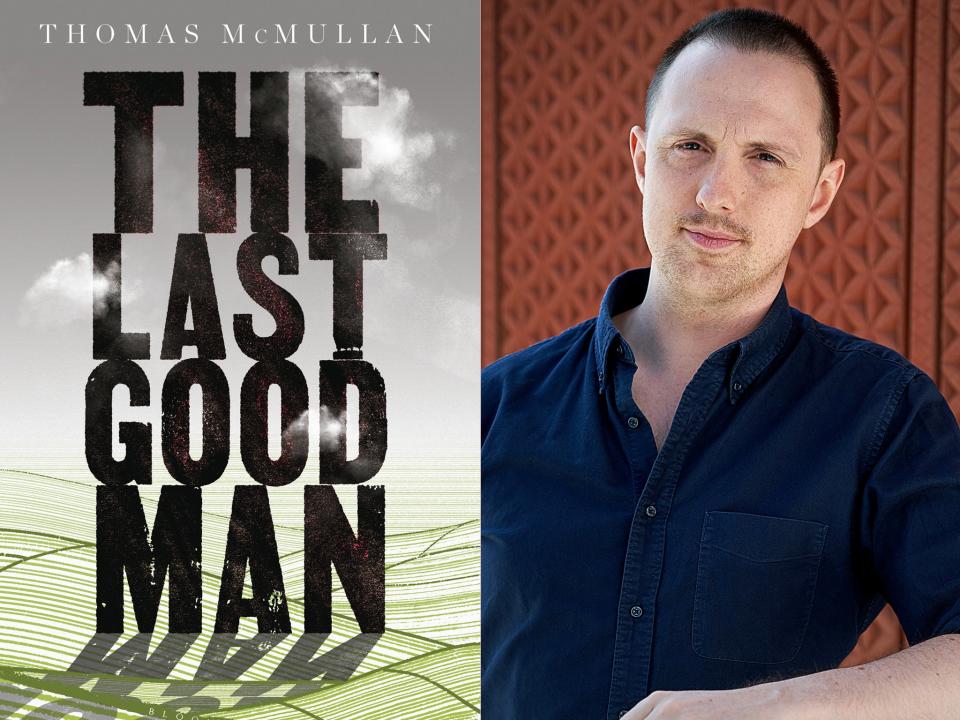
The Last Good Man by Thomas McMullan ★★★★☆
When Thomas McMullan taught in China a few years ago, he was struck by the discovery that people there still used the walls of public places to write anonymous (often hateful) messages about their neighbours. This was a tool used to devastating effect to persecute people during Chairman Mao’s Cultural Revolution in the 1960s.
In The Last Good Man, McMullan’s debut novel, protagonist Duncan Peck flees a burning city, where civilisation has broken down, in search of his cousin in Dartmoor. Peck dislikes the alienating atmosphere of city life, where he’d been “withering into invisibility”. Out on the moors, Peck believes he has found a place of tranquillity – one with tea rooms, barley fields, a church and a schoolhouse – which offers the beguiling possibility of community.
His cousin’s village sits in the shadow of a vast wall. At first its purpose “is obscure” to Peck. It soon becomes worryingly clear that it is the place where people go – often in secret, wearing hoods – to write anonymously about their neighbours. Some of the messages, painted in capital letters, are childish (“NOBODY LIKES GEOFF SHARPE!”), some are full of vile misogyny (“I’D LIKE TO CUT THE TITS OFF CHARLOTTE MORRIS”) and some contain accusations of heinous sexual crimes. Peck concludes that the wall is “alive in its malignancy”; he is concerned by how easily people parrot the view that there is “no smoke without fire”. Alleged wrongdoings have brutal consequences. Woe betide anyone caught by the rampaging “chasers”.
The Last Good Man explores themes of forgiveness and revenge and what can make a person feel “unmoored” in life. Twitter is the modern psychotic rabbit hole, of course, but McMullan’s tale is a brilliantly unsettling parable about how we police our societies through violence, language and shame – and how it’s easy to orchestrate the use of hatred in public spaces.
The Last Good Man by Thomas McMullan is published by Bloomsbury on 12 November, £16.99
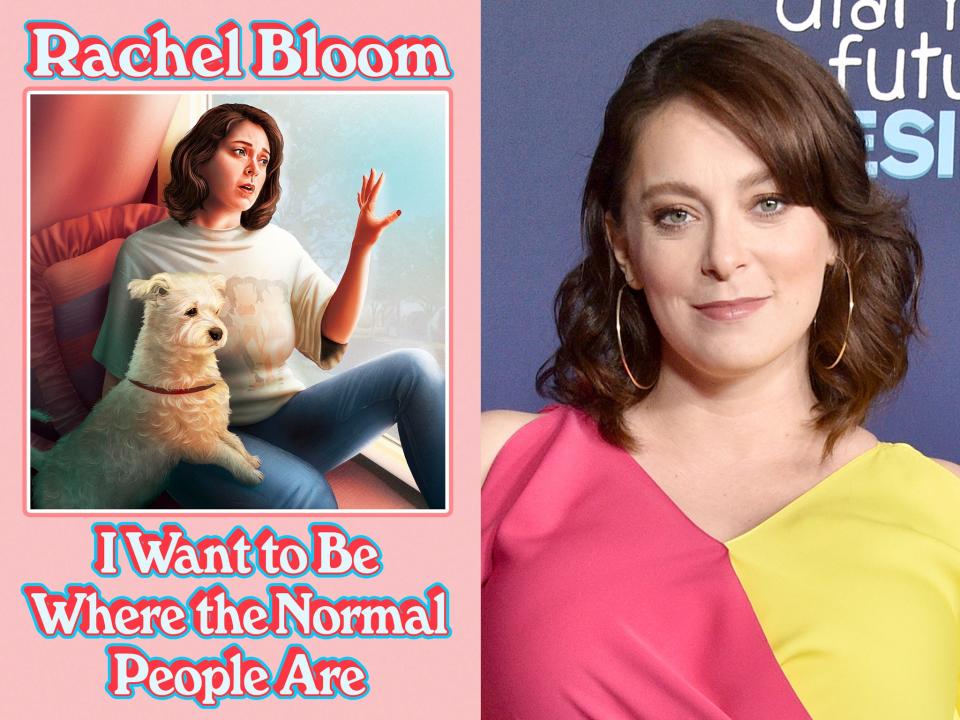
I Want To Be Where the Normal People Are by Rachel Bloom ★★★☆☆
In January 2016, Rachel Bloom won the Golden Globe and Critics’ Choice awards for Best Actress in a Comedy Series for her role as Rebecca Bunch in the Netflix musical-comedy series Crazy Ex-Girlfriend. In her memoir I Want To Be Where The Normal People Are, Bloom plays down the thrill of supposedly glamorous ceremonies. Blooms says that the Emmys venue, The Microsoft Theatre, was “freezing… I mean a full-on Patagonia”, while the Critics’ Choice Awards were held in a venue that was like “winter by the beach in a former airplane hangar”.
Bloom grew up in Manhattan Beach, California, and recounts the woes of going to school with “some real dumb-f***s with no sense of culture or introspection”. Bloom, a pale kid with transition-lensed glasses who sang show tunes under her breath, admits she was “insecure in my own skin”. She says she grew up living in Freakadonia. She says her parents weren’t popular either and jokes that the perfect haunted house for the Bloom family “would be a single room with a PE teacher in it”.
Crazy Ex-Girlfriend dealt with mental health issues and Bloom is candid about her own struggles with OCD and depression. “As magical as labels are, they do a sh-t job at describing how mental illness actually feels,” she writes. “Depression, for instance, doesn’t feel like this sterile hospital waiting room word: depression. It feels like my insides are turning grey, which makes the trees turn grey, which makes all life turn grey, which is the colour we all turn eventually because everything leads to nothingness.”
The book, whose title is a Little Mermaid reference, includes childhood diary entries, poetry, and drawings. Some of the humour is disarmingly crude and silly. You learn a lot about Bloom’s bowel movements as a child and adult, which may not be a surprise given that her parents videotaped her first crap on a proper toilet. There is a brief mention of the prejudice she faced, before she drolly comments, “I grew up in the type of Jewish household in which I didn’t know a word of Hebrew, but I knew EVERY celebrity that had ever said anything anti-Semitic.” The 33-year-old actor, who voices Queen Barb in the new Trolls World Tour movie, is a talented stand-up comedian and her wit shines through in the ironic LinkedIn profile that is reprinted.
It’s depressingly familiar these days to see a celebrity memoir get published no matter how slim the back catalogue of the person on the cover. Perhaps the lack of depth in her career is one reason why, overall, Bloom’s memoir is somewhat hit-and-miss despite entertaining moments. In addition, the chapter written in the voice of her dog Wiley (featured on the book’s cover) is simply grating. However, the chapter recounting how the “slapdash, seat-of-your-pants, make-it-up-as-we-go-along feel” Crazy Ex-Girlfriend was created – and how Bloom got around the censors with risqué jokes – has more substance.
Bloom’s memoir was written before the full effects of the pandemic were clear. She added a moving “Normal Afterword”, in which she opens up about the problems of becoming a mother during the lockdown, an event that came at the same time she was struggling with grief for her musical co-writer Adam Schlesinger, who died from Covid-19 complications. “My world is still upside-down,” says Bloom, speaking for us all.
I Want To Be Where the Normal People Are by Rachel Bloom is published by Coronet on 17 November, £16.99
Read more
Six of the biggest books released this month
Forest Whitaker: ‘A lot of the issues in the Sixties are the same now’
Jodi Picoult: Trump fans say ‘I’m never reading your books any more’

